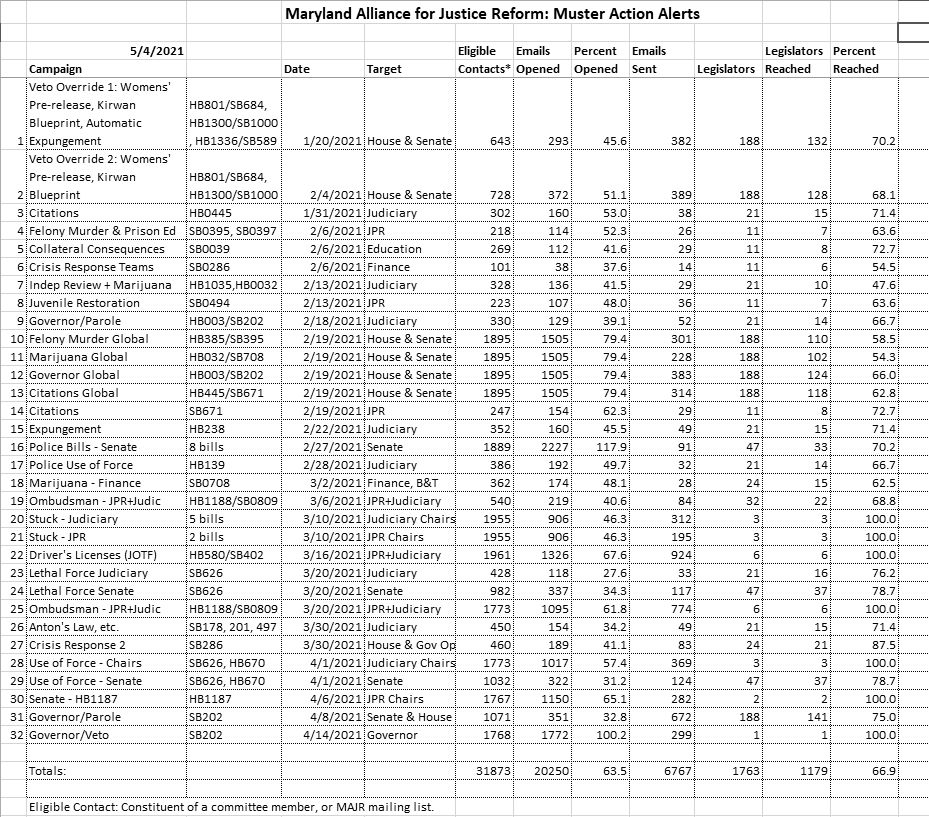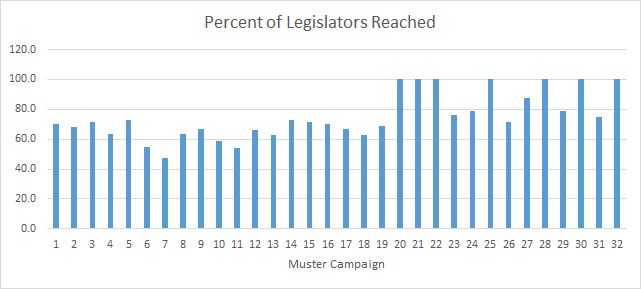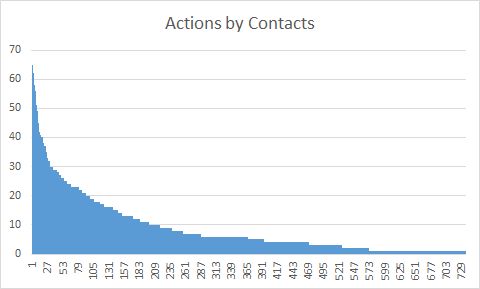A Pandemic Pivot
To achieve our primary objectives — elimination of race-based disparities and reduction of mass-incarceration — MAJR must convince legislators to support positive change. Like other lobby organizations, we encourage you, our members and representatives, to contact your legislators, explain our positions, and make an appeal for their support.
In 2021, the pandemic forced MAJR to change how we do lobbying. No more lobby days, no more office visits, no more face-to-face discussions, no more meetings with sponsors of our bills.
We needed to pivot, to change not our mission or vision, but our tactics and procedures. The solution was to employ advocacy software to engage our membership in public policy initiatives. For this purpose MAJR invested in the “Muster” advocacy software package. Fortunately, our members were prepared; many of you were getting used to doing business remotely, to monitoring email frequently, and to using digital resources on a daily basis.
Actions
MAJR asked you to use your digital skills to actively participate in the development of legislation at the State level that would make Maryland a more just society.
While the legislature only meets for 90 days in Maryland, during the last three months we issued thirty-two action alerts on criminal justice legislation. These alerts generated nearly 7000 emails to our legislators. To date the governor’s vetoes on MAJR-supported legislation have been overturned, and many pieces of our priority legislation have moved successfully to the governor’s desk.
The following table and figures show how well our new strategy worked. Data show how many of you (“eligible contacts”) opened our emails, how many messages were sent to legislators, and what percent of the legislators we wanted to reach heard from constituents that the particular legislation mattered. At various times MAJR targeted the entire legislature, the Senate or the House, individual committees, just the chairs of the important committees, and once the Governor as a single target. Our appeals asked recipients to override the Governor’s previous and current vetoes, to let committee members know how important their votes were on specific legislation, or, in the case of committee chairs, to allow a particular bill to be brought to the floor and voted on by the committee.

MAJR members respond in force!
MAJR received essential support from its members and friends. Most of you opened our emails, and for each appeal 60 to 80 percent of the legislators we hoped to reach were contacted. Sometimes only the constituents of committee members were asked to send a message, and sometimes we invited our whole email list to participate. We asked you to forward those emails to your own networks. At one point we had 1889 members on our list, yet a total of 2227 individuals responded – clearly the impact of your forwarding our original request to your wider networks. Text of our 32 campaigns can be found here.

Some of our members were situated perfectly as constituents of important committee members and, as a result, were asked to participate often. Others who were not represented on the Judiciary or Judicial Proceedings Committees were asked to take action when we targeted the entire House or Senate. One member responded with over 60 total emails to their senator and delegates. (Many of us in Maryland have one senator and two or three delegates. A campaign targeting the House would generate several emails.)

…And what have we learned?
We have learned that advocacy software makes a difference. Legislators recognize that MAJR members and their voting friends have sincerely-held positions on issues of criminal justice. While hand-written letters and telephone calls are thought to be most effective, our email campaigns have made their mark. When the Governor received nearly 300 emails asking him not to veto the Lifer’s Bill, we hope his office realized that these were from nearly 300 voters.
We have learned that Marylanders are ready to contact their legislators, given a little help from advocacy software like Muster. We have also learned a good deal about the power of networking. MAJR members provided a core of people energized by these campaigns. But equally important were the many members of other networks – our friends and neighbors, and our allied organizations – who eagerly took part in MAJR’s campaigns.
And what happens next?
We need to use our tools wisely. We need to continue to engage our members and make it simple for you to engage your legislators in turn. Advocacy software is not only a means to get votes in the House or Senate. This tool is a vehicle for the citizens of Maryland to get to know their representatives, and for those representatives to get to know their constituents. Conversation feeds relationships, and those relationships lead to better understanding. As you build a relationship with each of your legislators, your voice will become still more powerful.
Isn’t that what democracy is about? Participation is the touchstone of representative government. As the Brookings Institute observed, “Civic engagement is the glue that holds self-government together. Action is essential to maintaining the foundations of our democracy, no matter which political party happens to be in power. We must learn and practice the skills of civic participation beginning with voting and moving onto legislating, speaking out, and building coalitions to solve problems on the local, state, and federal levels.”
If we don’t speak, we allow the voices of lobbyists from the staunch and protective segments of our society to capture the airwaves. Our voices are powerful and should be used, not quieted. You have joined us on this journey. Feel your power. Stay with the action.














